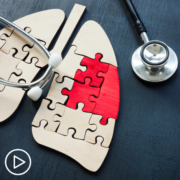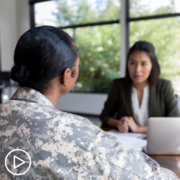Peer Insights: Practicing Cultural Humility to Empower Your Patients
Peer Insights: Practicing Cultural Humility to Empower Your Patients from Patient Empowerment Network on Vimeo.
How can healthcare providers practice cultural humility to empower their patients? PEN’s Vice President of Programs Aïcha Diallo discusses barriers healthcare providers may encounter and advice for overcoming or minimizing these barriers to cultural humility.
Related Resources:

|

Peer Insights: Understanding Cultural Competence vs. Cultural Humility |

Cultural Humility: Fostering Respect & Understanding Your Patient’s Unique Identity Infographic |
Transcript:
Dr. Nicole Rochester:
Cultural humility has practical implications for improving healthcare outcomes such as improved communication, empowerment, and trust between providers and their patients, and also enhance patient-centered care. But we know that there are barriers that may exist to putting these things into action. Aicha, what are some common challenges that healthcare providers face when trying to practice cultural humility?
Aïcha Diallo:
Some of the things that I’ve been seeing is really not being able to carve out enough time to listen to their patients’ unique traits, unique characteristics, needs, wants, concerns, or even goals. We always encourage our patients and care partners to put all of this on the table and to share this with their healthcare teams. But something that we always hear is that there wasn’t enough time allocated to even go there.
So that is a challenge for someone who wants to practice cultural humility but doesn’t have enough time to be able to do that. I would also add to that, that it’s giving, and I sort of mentioned this earlier, sort of giving enough room for their patients to feel comfortable to engage in shared decision making, for them to feel that they are co-decision makers and it’s the time for them to express what’s going on. And to even add more.
Another challenge is working in an environment that does not always promote cultural humility. So the healthcare professional might feel alone and feel that they’re practicing this on their own, and there are no other colleagues or no one else with them throughout this. One of the other things I would like to also add as a challenge is not being able to work as a group to identify some of the patient’s barriers that they’re facing and even providing helpful resources that could be meaningful to them.
Dr. Nicole Rochester:
Thank you. You’ve talked about a lot of these barriers that are really outside of the control of the provider. And so that brings me to my next question, which is really about the systems in which we provide care. What is the role of healthcare institutions supporting ongoing learning and environments that actually promote cultural humility so that providers can truly empower their patients?
Aïcha Diallo:
It’s really ensuring that patients and their families can access effective and equitable care regardless of who they are, where they’re from, what they look like, where they live. I think here at Patient Empowerment Network, we have several cultural humility resources for healthcare professionals, which include infographics that are embedded in the EPEP program and other resources that incredibly useful and important to them to access at their fingertips and be able to feel empowered themselves so they can continue to empower their patients.
We have added recently over a 100 languages to our website to make sure that our resources are available to anyone. And one of the last things that I would add as well is we continue to encourage healthcare professionals to share our PEN’s resources because by doing that, not only that the healthcare professional empowers themselves comes ready with information and comes humble with a step back and say, please share more.
But they’re also able to provide those resources and programs to their patients so they can access them so they could also feel empowered. So I would add, please continue to share our PEN’s resources. Make sure you include a lot of the tools and the tips that are useful for your patients regardless of what language they speak or where they live or again, where they’re from. So providing our digital literacy skill programs are also really important, our Digital Sherpa and Digitally Empowered, with your patients and families as it will provide them with some additional insight and a way for them to feel that they do have presence and they sit at the table to engage better with their healthcare teams.
Dr. Nicole Rochester:
Thank you so much. This has been such an enlightening discussion and lots and lots of resources that PEN provides. And thank you for all that you all are doing in this space. Aicha Diallo, vice President of Programs at Patient Empowerment Network, thank you so much for your wisdom and your insight.
Aïcha Diallo:
My absolute pleasure. Thank you so much for having me.






